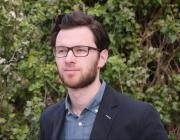Tuesday, February 7th
12:00 Beginning of the registration
in the Los Angeles building
13:00 – 14:30 Welcome and Introduction
in the Los Angeles building
14:30 – 18:00 Hands-on session
in the Computer Science building
Wednesday, February 8th
New Methods Session
in the Los Angeles building
09:00 – 09:20 Report: Origin independent intensities: length vs. velocity gauge
Lasse Kragh Sørensen, Uppsala University
09:20 – 09:40 Report: Frozen-Density Embedding for CASCI calculations
Alexander Zech, University of Geneva
09:40 – 10:00 Report: Muonic spectroscopy, an opportunity for theoretical chemistry to excel
Roland Lindh, Uppsala University
10:00 – 10:40 Scientific Perspective: Condensed-phase chemistry with the Effective Fragment Potential method: Theory and applications
Lyudmila Slipchenko, Purdue University
10:40 – 11:00 Coffee break
11:00 – 11:40 Scientific Perspective: Ultrafast non equilibrium dynamics induced by attopulses
Françoise Remacle, University of Liège
11:40 – 12:20 Scientific Perspective: Nonadiabatic Processes in Molecules Monitored with Coherent Ultrafast Nonlinear Spectroscopic Techniques
Benjamin Fingerhut, Max Born Institute Berlin
12:20 – 14:00 Lunch
Future Development Session
in the Los Angeles building
14:00 – 14:20 Report: Molcas' web presence: what we could do even better
Luca De Vico, University of Siena
14:20 – 14:30 Report: Brief activity report and a couple of Molcas-related issues
Liviu Ungur, KU Leuven
14:30 – 14:40 Report: Parallel Performance of CASSCF/CASPT2 calculations within Molcas
Markus Oppel, University of Vienna
14:40 – 15:00 Report: Towards LGPL distribution of OpenMolcas
Valera Veryzaov, Lund University
15:00 – 15:20 Coffee break
15:20 – 18:00 Discussion/Future development
Thursday, February 9th
DMRG Session
in the Los Angeles building
09:00 – 09:20 Report: Capabilities of the QCMaquis DMRG program in Molcas - An Overview
Markus Reiher, ETH Zürich
09:20 – 09:40 Report: DMRG-CASPT2 with Molcas-CheMPS2 interface
Quan Phung, KU Leuven
09:40 – 10:00 Report: n-electron valence state perturbation theory with DMRG and Cholesky decomposition: application to spin-crossover compounds
Leon Freitag, ETH Zürich
10:00 – 10:20 Report: Automated Selection of Active Orbital Spaces
Christopher Stein, ETH Zürich
Molecular Dynamics Session
in the Los Angeles building
10:20 – 10:40 Report: Quantum-classical dynamics for electronic non-adiabatic processes: An exact-factorization approach
Federica Agostini, University Paris-Sud
10:40 – 11:00 Coffee break
11:00 – 11:40 Scientific Perspective: Dynamics of Organic Materials with Optical Activity: Advances, Appraisal, Applications
Mario Barbatti, Aix-Marseille University
11:40 – 12:20 Scientific Perspective: Gaussian-based direct quantum dynamics applied to non-adiabatic photochemistry
Benjamin Lasorne, University Montpelier
12:20 – 14:00 Lunch
14:00 – 14:10 Report: On the implementation of XMS-CASPT2 in Molcas
Per Ake Malmquist, Lund University
14:20 – 14:40 Report: Molecular Dynamics with Molcas: Technical details and Application to chemiluminescence
Morgane Vacher, Uppsala University
14:40 – 15:00 Report: Non-equilibrium Electronic Dynamics and Potential Application
Raphael Levine, The Hebrew University of Jerusalem
15:00 – 15:20 Coffee break
15:20 – 15:40 Report: Absorption lineshape of the rhodamine dimer tethered on DNA from molecular dynamics simulation: the effect of environment and geometry sampling on the electronic properties of the chromophore
Ksenia Komarova, University of Liège
15:40 – 16:00 Report: Converging many-body correlation energies by means of sequence extrapolation
Javier Segarra-Martí, ENS Lyon
16:00 – 16:20 Report: Controlling excited state dynamics by surface plasmons: Molecular Dynamics for Strong coupling
Hoi Ling Luk, University of Jyväskylä
19:00 Gala Dinner (at The Eucalyptus)
Friday, February 10th
09:00 – 12:00 Old City Tour
12:00 Departure

